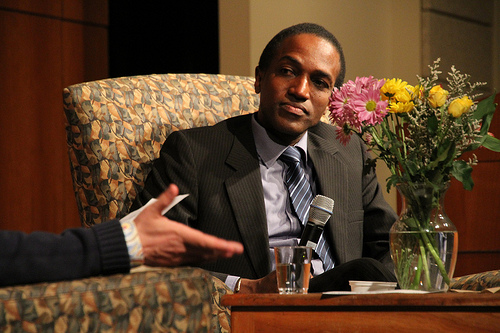Jamaica as a model for anti-AIDS, anti-homophobia action
Colin Stewart is a 45-year journalism veteran. He is the…
One of several quick recaps of news related to this week’s International AIDS Conference in Washington, D.C.:
Lessons from “the most homophobic place on earth”

Jamaican gay activist Maurice Tomlinson says his country is making progress in the fight against homophobia and could even serve as a model for activists seeking successful techniques for waging the same battle elsewhere.
In a speech to the pre-conference about men who have sex with men (MSM), Tomlinson said, “Recognizing the full human rights of MSM is critical to effectively ending the regional HIV pandemic. With HIV prevalence rates ranging from 6.1% in the Dominican Republic to the disastrously high figure of 32.9% among Jamaican MSM, there is no way MSM can be ignored in any national HIV response.”
“HIV is not just a public health issue,” he said. “The HIV epidemic has taken its heaviest toll on socially, financially, politically, and legally marginalized communities:
- Gay men and other men who have sex men (MSM)
- Sex workers
- People who use drugs
- Transgender people
And permit me to add to this list: women.
This epidemiological fact is the biological manifestation of social fault lines. Gay men/MSM, people who use drugs, sex workers, transgender people (and also women) are legally marginalized, socially stigmatized, discriminated against, and are commonly the targets of brutal violence worldwide.”
Tomlinson spoke of positive steps taken in his home country, Jamaica, “a country once viewed as the most homophobic place on earth.” Those have included:
- Working to “provide vital information to counter the still persistent myth that Jamaican LGBT are somehow engaged in an internal warfare, which accounts for all the homophobic attacks.”
- A lawsuit against the country’s anti-sodomy law.
- “Innovative national and regional tolerance-themed public service announcements”
- Persuading to Coca-Cola to act against a homophobic musician it had sponsored. “When we heard that Coca-Cola sponsored a reggae concert at which a notorious homophobe called for the murder of gays, we immediately alerted the company, and they suspended sponsorship of music events in Jamaica. They also promised to review their sponsorship policy to prevent a repeat of such an event. I am happy to report that the new, more robust sponsorship policy is now in place,” he said.
Tomlinson admitted that the effort has not yet achieved its goal, but he suggested that other countries could learn from the Jamaican approach to the fight against homophobia:
I daresay our approach of going after individuals instead of entire countries is scalable, and governments, such as the UK and the US, who are interested in combating homophobia should focus on those directly responsible, instead of blanket aid-conditionality. Visas of homophobes can and should be revoked and their foreign assets frozen. In the meantime, aid can and should be re-directed to groups engaged in documenting, reporting, and responding to LGBT abuses.
Related articles
- Human Rights Watch urges Jamaica to scrap anti-buggery law (caribbean360.com)
- As global AIDS conference gets under way, Jamaican activists seek more robust focus (miamiherald.com)
- Two more gay men killed in Jamaica; panel seeks probe (76crimes.com)
- Jamaican, U.S. leaders in human rights Hall of Fame (76crimes)
- Jamaican clergy fret: Hate sin but treat LGBT sinners? (76crimes)


